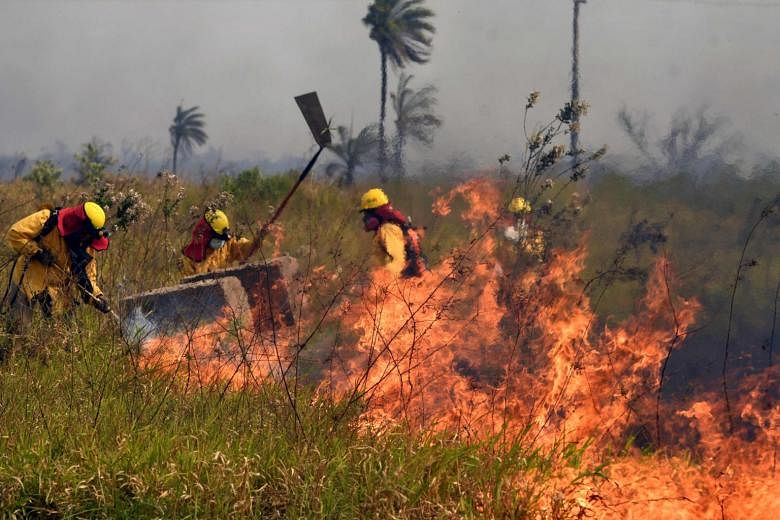LA PAZ (REUTERS) - Fires have laid waste to around 150,000 hectares of forests and grasslands so far this year in the Bolivian lowlands, the country's authorities have said, with firefighters battling scattered blazes since last week in eastern Santa Cruz.
The fires spread through communities in the Amazon and Chaco regions of Bolivia, which are part of Latin America's two largest transnational woodland areas where the destruction is frequently caused by clearing land for grazing, planting and human settlements.
Juan Carlos Calvimontes, the vice-minister of civil defence, said the fires were almost all started by humans and that those found responsible would be forced to pay for the cost of extinguishing them.
"The origin of the fires, almost 90 per cent, are being set, they are not starting by themselves," he told local television.
Crews of soldiers, firefighters and volunteers have brought fires that started last week and were exacerbated by high winds and sweltering temperatures largely under control with the support of aircraft dropping water.
A report by the Civil Defence ministry said hot spots that identify active fires have fallen from 800 to 170 over the last week. No damage to property or harm to humans has been reported, it added.
Bolivia recorded the worst forest fires in its history in 2019, when flames destroyed more than 6.4 million hectares of rural land, according to data from the Bolivia Documentation and Information Centre.
This year, the fires - which predominate in the southern hemisphere winter of May to early August - have been fewer, with 156,799 hectares recorded burned, compared with 404,527 hectares in the same period in 2020.
At present, the hot and semi-arid forested area of Chiquitania, between the Amazon and the Chaco, is the most affected zone. The area is home to indigenous communities as well as rich biodiversity and wildlife, including jaguars, caimans and snakes.
"The sad thing is that every time some arsonist sets a fire, it is destroying nature, a habitat where thousands of species feed and live," said Jerjes Suárez, a veterinarian from Roboré, one of the affected towns, as he held up a Chaco Tortoise that had narrowly escaped the flames.

